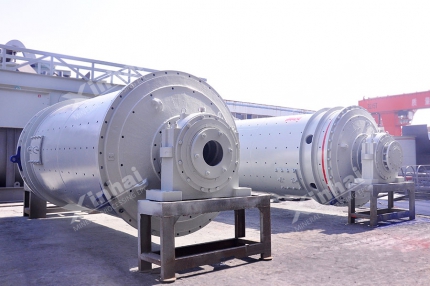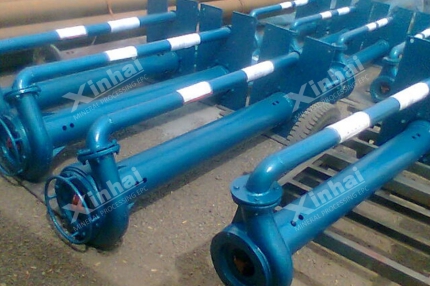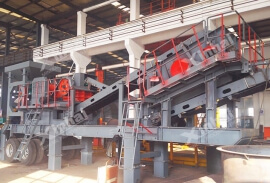Molybdenum is an important rare metal resource. And molybdenite (MoS2) is the most widespread among various molybdenum ores, almost 99% molybdenum production is obtained from molybdenite in the world.
Single molybdenum and copper-molybdenum ore are the two most common molybdenum minerals in the mineral processing plant. The main useful mineral in single molybdenum ore is molybdenite. Because of the good natural buoyancy of molybdenum ore, Xinhai often adopts direct floatation process after crushing and grinding. And the main useful minerals in the copper-molybdenum ore are chalcopyrite, pyrocopper, molybdenum and so on. In the practice of production, Xinhai usually adopts bulk flotation process that floats copper-molybdenum bulk concentrate firstly then separates copper-molybdenum.
What's more, single molybdenum ore and copper-molybdenum ore have low hardness, they are easy to become sliming in the grinding process, so Xinhai often uses stage grinding+stage the flotation process. The primary molybdenum ore has a very low grade (only 0.01~0.4%, above 0.2% is rich ore), which should be several times of cleaning in the flotation process (4~10 times).
Molybdenum ore dressing equipment mainly includes crusher, screen, ball mill, classifier, flotation cell, thickener, filter, etc.
Use the table of contents below to navigate through the guide:
01Crushing and grinding process of molybdenum ore
Single molybdenum ore has low grade, fine particle size and complex composition. The typical crushing and screening process is coarse crushing, self-grinding, screening and fine grinding. The raw single molybdenum ore is crushed to the appropriate grinding feed size. The main crushing and screening equipment is shown below:
| Equipment | Type | Particle Size(mm) |
| Jaw Crusher (coarse crushing, secondary crushing) | Swinging Jaw Crusher | 160~320 |
| Cone Crusher(secondary crushing, fine crushing) | Spring Cone Crusher, Hydraulic Cone Crusher | 22~75 |
| Screen | Round Vibrating Screen(YA), Linear Vibrating Screen | 0~12 |
| Autogenous Mill | wet autogenous mill | 0~80 |
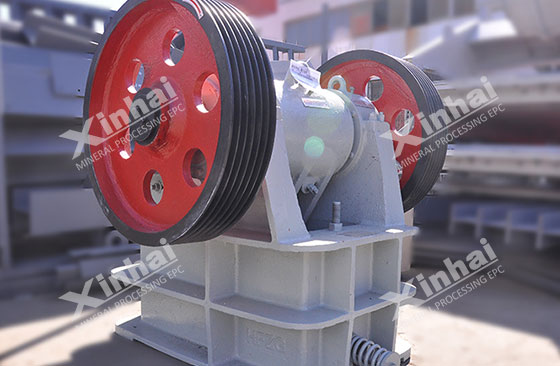 Jaw Crusher
Jaw Crusher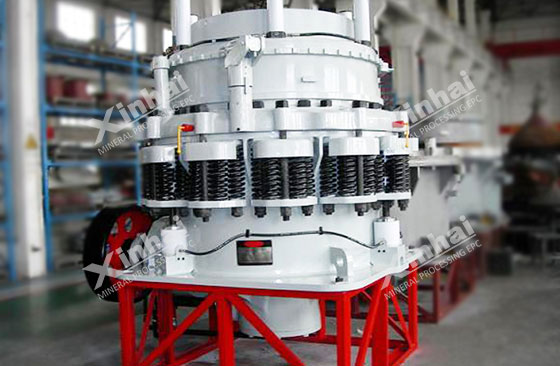 Spring Cone Crusher
Spring Cone Crusher Round Vibrating Screen(YA)
Round Vibrating Screen(YA)02Grinding process of molybdenum ore
Because single molybdenum ore and copper-molybdenum ore have low hardness, they are easy to become sliming in the grinding process, so Xinhai often uses stage grinding+stage the flotation process. The typical grinding process is one stage grinding, classifying, roughing, two-stage grinding, stage, classifying, one cleaning, three-stage grinding, classification, two cleaning, four stage grinding, classifying, 3~5 times cleaning, thickening and dewatering. The main grinding equipment is shown below:
| Equipment | Type |
| Grinding | Grid Type Ball Mill, Overflow Type Ball Mill, Rod Mill |
| Classifying | Spiral Classifier, Hydrocyclone |
| Flotation | Mechanical Agitation Type Flotation Cell, Air-inflation Mechanical Agitation Floatation Cell |
| Thickening | Peripheral Transmission Thickener, Hydraulic Motor Driving Center Thickener, Efficient Deep Cone Thickener, Tilted Plate Thickener |
| Filtering | Vacuum Filter, Ceramic Filter, Drum Filter |
 Grid Type Ball Mill
Grid Type Ball Mill Overflow Type Ball Mill
Overflow Type Ball Mill Spiral Classifier
Spiral Classifier03Separation process of molybdenum ore
Copper and molybdenum grade in copper-molybdenum ore is not high. If adopting differential flotation process, the processing capacity of slurry is larger and the production cost is much higher. Therefore, copper-molybdenum ore beneficiation process basically adopts coarse grinding, classifying, and bulk flotation process to get copper-molybdenum bulk concentrate, fine grinding, classifying, reagent removal, copper-molybdenum separation, thickening and filtering process. The involved copper-molybdenum separation has always been the technical difficulty for copper-molybdenum ore beneficiation process. At present, the developed copper-molybdenum separation technologies include conventional flotation process, nitrogen flotation process, pulsating high magnetic separation process and passivation process.
Conventional floatation process: Xinhai usually adopts molybdenum float by copper depression process. The key part of this process is to realize the copper inhibition. Currently, the effective inhibitors include inorganic substances (such as sodium sulfide, cyanide, etc.), organism (ethanethiol) and sodium silicate.
Nitrogen flotation process: Adding a certain amount of nitrogen to the slurry, which make those inhibitors (such as sodium sulfide, sodium bisulfide, etc.) with less pollution replace the poisonous inhibitors (cyanide).
Pulsating high magnetic separation process: Since chalcopyrite is weak magnetic mineral, molybdenite is on-magnetic mineral. Therefore, they can be separated by pulsating high magnetic separation process.
Passivation process: In bulk concentrate, the copper ore surface is oxidized by adjusting slurry temperature and PH value, so that copper-molybdenum separation can be achieved by hydrophily or hydrophobicity of copper minerals.


 marketing@ytxinhai.com
marketing@ytxinhai.com  0086 13810327080
0086 13810327080 




























































































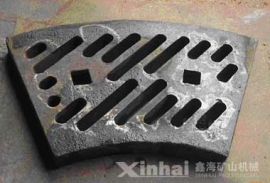









 CHAT
CHAT MESSAGE
MESSAGE





